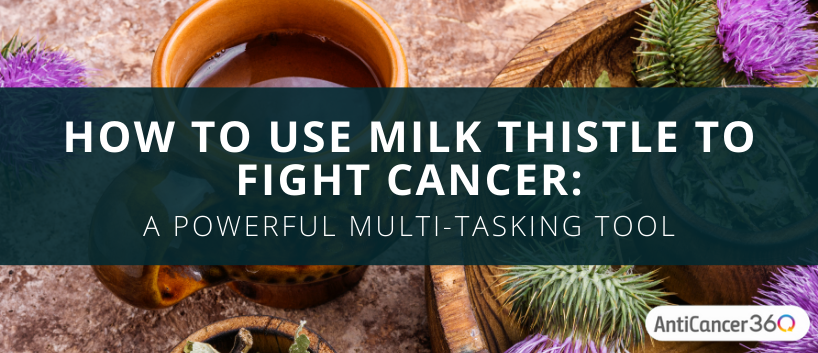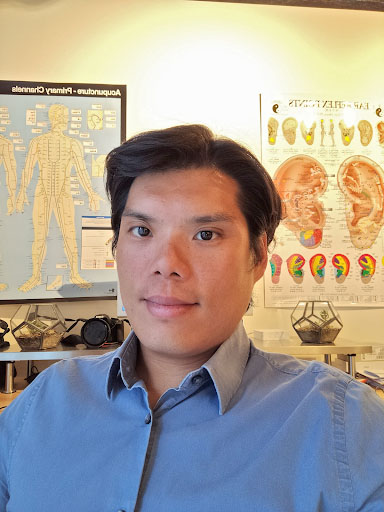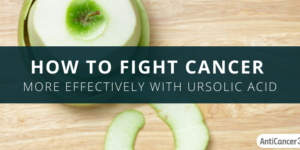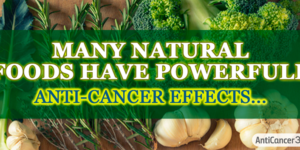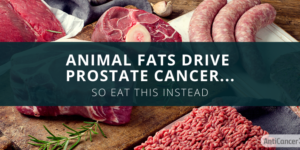When you are fighting late-stage and challenging cancer, it’s important to support your body in every way possible. Fortunately, there are many approaches that you can consider, in addition to your oncologist’s treatments. This is especially important for difficult and later-stage cancers.
Overall, many anticancer substances and strategies can help you fight cancer from every direction. Depending on your situation, milk thistle may help you fight cancer more effectively, in addition to your oncologist treatments.
So in today’s post, we’re going to show you the scientific research behind milk thistle’s many potential anticancer benefits. Ultimately… milk thistle is a safe, natural cancer-fighting substance that can help starve cancer and weaken it from many different angles.
What is Milk Thistle?
Silybum marianum is the scientific name for the plant commonly known as milk thistle. Milk thistle plants have bright purple flowers, prickly white-veined leaves, and milky sap [1].
Milk thistle extract is obtained from the seeds and other above-ground plant parts. The extract contains several beneficial compounds including silymarin, silybin, and silibinin [2].
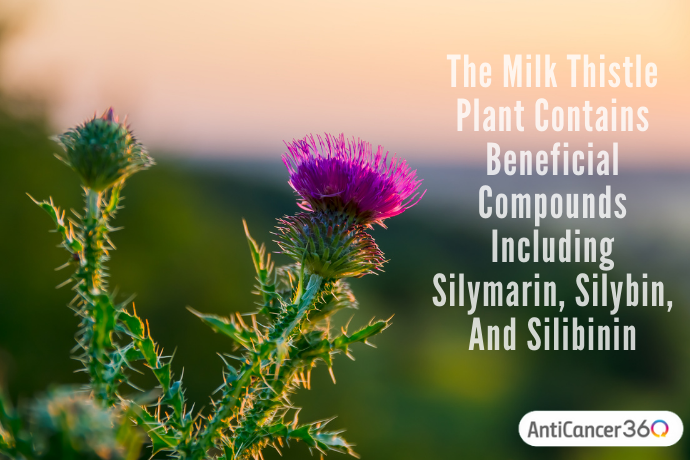
Silymarin is most well-known for supporting liver health. It’s been extensively researched by scientists for its potential to protect against or reverse liver damage.
Research supports milk thistle as a potential protectant against liver damage caused by:
- Alcohol
- Chemotherapy
- Toxic chemicals and poisons
- Non-alcoholic fatty liver disease
- Cirrhosis
- Hepatitis
- Chronic inflammatory liver disease
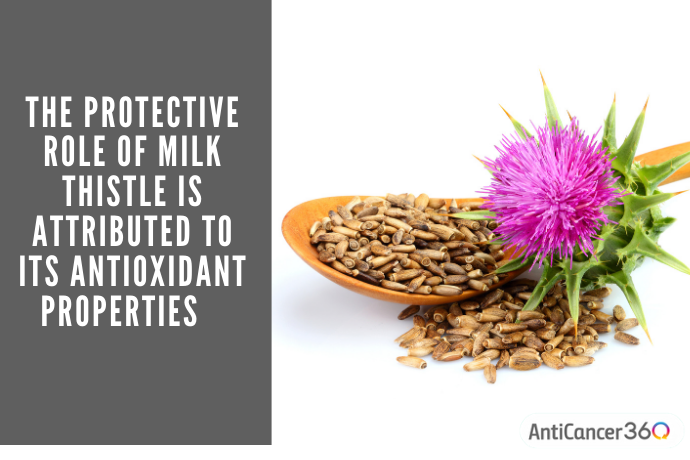
The protective role of milk thistle is attributed to its antioxidant and anti-inflammatory properties. There is also evidence that milk thistle supports healthy blood sugar levels. Next, and most importantly for today’s post, we will take a closer look at the potentially excellent anticancer benefits of milk thistle.
Cancer Metabolism Suppression: How to Starve Cancer with Milk Thistle
Cancer metabolism is the process in which cancer makes energy from available nutrients (like sugar, protein, and fat). So one of the key strategies for fighting cancer is figuring out how to starve cancer… and we can use certain natural supplements, like milk thistle, to help with this strategy.
Starving cancer cells (with drugs and supplements) without harming healthy cells is crucial when you are trying to fight cancer in every direction. So our goal is to prevent sugar, fats, and proteins from nourishing cancer cells.
This weakens cancer cells, makes them vulnerable, which may boost the effectiveness of cancer-killing treatments. Milk thistle is one of many natural substances that have this potential. Now let’s look at the evidence showing how milk thistle naturally blocks cancer cell metabolism.
Milk Thistle May Block Cancer Metabolism of Glucose
Cancer cells have different metabolic needs than that of healthy tissues. Most cancer cells have an altered metabolism that allows them to break down sugar (glucose) to make energy.
Tumor cells typically rely on significant amounts of sugar (glucose) to fuel their high-demand energy needs. Glucose is the primary source of energy for many types of cancers.
GLUT1 is a protein on the cell surface that transports glucose from the bloodstream into the cells. In many forms of cancer, tumor cells tend to grow more GLUT1 transporters on their surface than normal, healthy cells. This is known as the upregulation of GLUT1. An overabundance of GLUT1 helps fuel uncontrolled growth in aggressive cancer disease. So, GLUT1 is a significant target in cancer treatment.
Milk thistle extract has demonstrated reduced pancreatic tumor growth in mice. In a study of pancreatic cancer in mice, it appears that silybin had multiple effects on the tumor cells, including the down-regulation of GLUT1. With fewer GLUT1 transporters on their surface, the tumor cells lacked the sugar they needed to produce cellular energy (known as ATP).
Just as any starving creature becomes weak, the glucose-deprived pancreatic tumor cells failed to thrive after exposure to silybin, and the pancreatic tumor growth in mice was reduced [3].
These researchers found that the silybin-treated cells had significantly lower levels of glycolysis end-products. Glycolysis is a process in cells that converts glucose into ATP (energy) and lactate.
Without glycolysis, the end-products of the downstream pentose phosphate pathway (PPP) were also reduced. This includes the cell’s building blocks for genetic materials (nucleosides). Without these crucial nutrients and genetic materials, the cancer cells cannot continue to grow and divide rapidly [3].
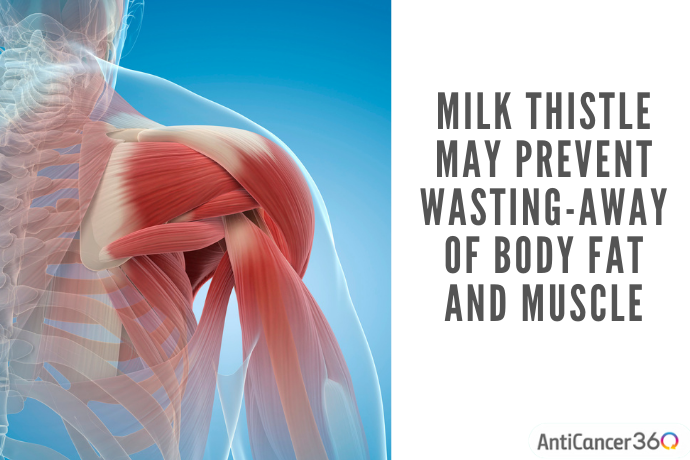
Another interesting outcome of this study was that silybin seemed to prevent cachexia in the mice. Cachexia is the involuntary wasting away of body fat and muscle. Cachexia is frequently associated with many forms of cancer and is linked to aggressive disease. Interestingly, the silybin-treated mice also had increased physical activity levels and increased grip strength compared to non-silybin treated mice [3].
Milk Thistle May Also Help Against Glutamine Related Cancer Metabolism
Unfortunately, cancer cells are creative at adapting. If tumor cells are sugar-deprived, they can reprogram themselves to tap other energy sources like protein and fat.
Proteins have numerous essential cell functions including metabolism and growth. Amino acids are the building blocks of proteins… and glutamine is the most abundant amino acid in our bodies. Tumor cells demand a high level of glutamine for their metabolic needs. Finding ways to interfere with cancer cell metabolism of glutamine is a trending goal of cancer treatment research and development.
There is evidence that milk thistle extract can influence a glutamine-related pathway called “mTOR” (the mammalian target of rapamycin).
mTOR is an enzyme (protein kinase) that is recognized as the principal regulator of animal growth, and is a crucial link between the availability of nutrients and metabolic control. Scientists have learned that the mTOR pathway becomes hyperactive during various cell processes, such as tumor formation and insulin resistance, and becomes wildly uncontrolled in cancer and type 2 diabetes.
Researchers’ findings show that milk thistle extract (silymarin) has anticancer properties in part by blocking mTOR signaling. Several recent studies have suggested that suppressing mTOR activity may provide a key mechanism underlying the cancer-fighting action of milk thistle.
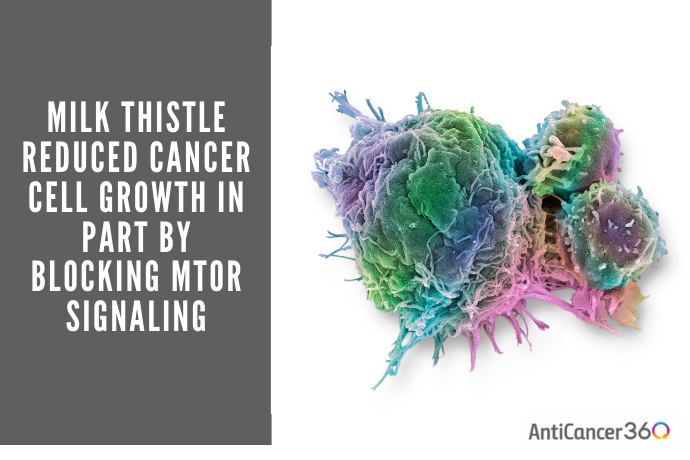
A study in 2015 demonstrated that silymarin reduced the growth of kidney cancer cells (renal cell carcinoma or RCC) and blocked a specific mTOR signaling pathway. This research showed for the first time that silymarin causes cell death (apoptosis) of RCC cells by inhibiting a certain mTOR signal known as the mTOR-GLI1‑BCL2 pathway [4].
In 2016, another laboratory study found that silybin suppresses growth and leads to apoptosis of multiple myeloma cells by blocking a different mTOR signal, the PI3K/Akt/mTOR pathway [5].
Numerous other laboratory studies support milk thistle’s promising anticancer effects on prostate, skin, bladder, lung, colon, breast, ovarian, renal, liver, cervical, mouth, and other cancers [5].
Milk Thistle Reprograms Cancer Metabolism of Fats
Besides its ability to block steps of cancer cells’ sugar and protein metabolism, milk thistle is also recognized for its effects on the metabolism of fats (lipids and cholesterol).
Silymarin influences the actions of proteins called SREBPs (sterol regulatory element-binding proteins). SREBPs function to construct important enzymes which manage and build fats, lipids, and cholesterol. These fatty substances are used to build cell membranes and are vital for cancer cell survival.
Population studies have shown that abnormal lipid metabolism and insulin resistance are significant risk factors for a type of cancer called endometrial carcinoma. This type of cancer can affect young women, but current standard therapies can also be harmful to their future reproductive health.
Scientists have determined that SREBP1 becomes hyperactive in endometrial carcinoma cells. These effects suggest that SREBP1 is involved in endometrial carcinoma progression and is an excellent target for potential EC treatment [6].
The results of a 2019 laboratory study revealed that silybin greatly reduced cell growth and lipid accumulation by blocking the SERBP1 signal pathway in endometrial carcinoma cells. These researchers also observed that silibinin had the effect of promoting apoptosis (programmed cell death) of endometrial carcinoma cells in mice [6].
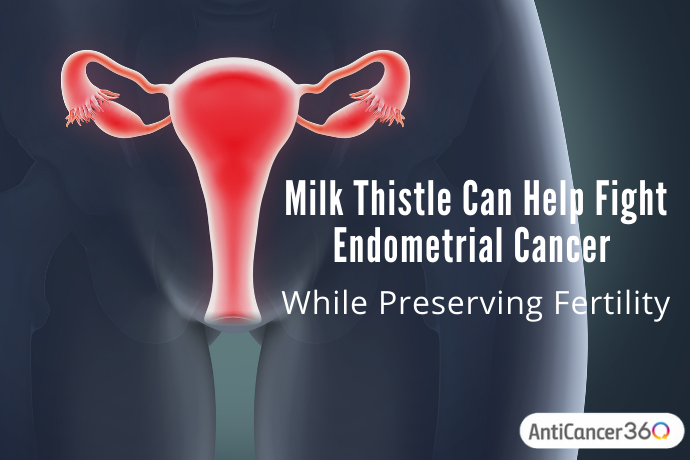
These researchers concluded: “These basic findings validate that silibinin exhibits potential anti-cancer effects [on the therapy of endometrial carcinoma ]. For the early type 1 EC [endometrial carcinoma] patients who wish to retain fertility, silibinin is anticipated to be a new, safe and effective option for conservative and adjuvant therapy.” [6]
Aggressive Integrative Approach with Milk Thistle
Synergistic Effects of Milk Thistle on Cancer Stem Cells
So besides milk thistle’s metabolic blocking effects, this natural substance may also help to overcome resistance.
Resistance appears when tumors that have been previously shrinking with treatment suddenly begin to grow again. Resistance is a problem that eventually occurs with many cancers. The study of cancer stem cells has shed some light on why some tumors become resistant to multiple drugs.
In results presented at the American Association for Cancer Research (AACR) Annual Meeting in 2015, a University of Colorado study shows that oral purified milk thistle extract slows colorectal cancer stem cells’ ability to grow [7].
“It’s very simple: tumors from mice that were initially fed silibinin had fewer cancer stem cells, were smaller, had lower metabolisms, and showed decreased growth of new blood vessels. Importantly, when these cancer stem cells from tumors in mice fed silibinin were re-injected into new mice, we found these stem cells had lost their potential to repopulate even in the absence of [continued] silibinin exposure,” says one of the study’s leaders, Rajesh Agarwal, PhD [7].
It is essential to consider milk thistle as part of an integrative, complementary approach (along with traditional treatments, due to the limited evidence of milk thistle’s impact on human cancer stem cells.)
Milk Thistle May Protect Against Side Effects While Enhancing the Benefits of Cancer Treatments
Due to its multi-pronged anticancer and protective effects, milk thistle has been shown to help protect against some of treatments’ side effects.
Chemotherapy medicines and radiation are common cancer treatments. Unfortunately, chemo and radiation side effects can be very severe and can negatively impact people’s quality of life.
So we know that milk thistle supports the liver, but its protective effects may extend beyond the liver. Milk thistle extract has also been applied to the skin and studied as a protectant from radiation damage [1] Evidence from several human clinical trials has shown the benefits of silymarin 160 to 600 mg daily with protecting the liver, skin, and mucosal membranes from radiation-induced damage [8].
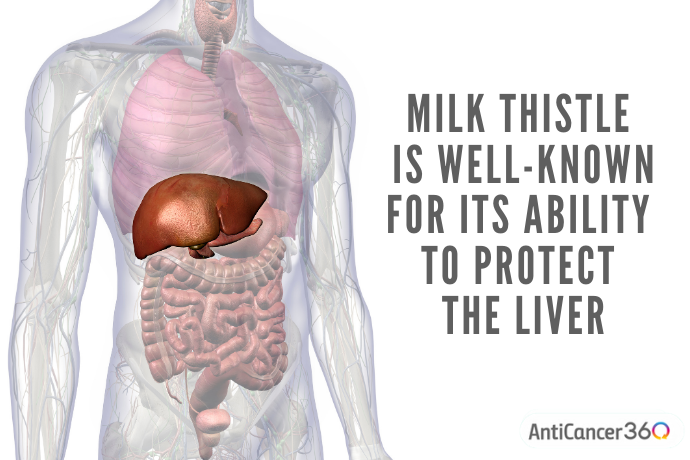
In another human study, oral tablets and intravenous (IV) injections of silymarin were compared for their ability to protect against radiation-induced liver damage. Doses were given 1, 3, and 7 days after radiation treatments, then the results were analyzed [9].
Both oral and IV silymarin showed liver-protecting action, but IV showed the most pronounced protection. Overall, the researchers concluded that silymarin’s protective effect was due to its antioxidant action and free radical scavenging ability [9].
Injected formulations of silymarin aren’t so easily accessible, but there are some enhanced-absorption formulations of oral milk thistle available. Liposome or phytosome formulations, for example, could potentially provide absorption that could come much closer to the level of intravenous injections, when compared to standard oral formulations.
Research in rats revealed that silymarin prevented or decreased the kidney-damaging effects of cisplatin, a chemotherapy drug. A study was done to evaluate if these effects could be reproduced in humans. In a clinical trial of 60 adult patients undergoing chemotherapy with cisplatin, half of the patients received silymarin 140 mg tablets twice daily for seven days before cisplatin treatment. The other half of the patients (the control group) received cisplatin alone [10].
After two weeks, researchers analyzed blood samples from both groups. The control group, who did not receive milk thistle, experienced significantly higher creatinine and blood-urea nitrogen (BUN) levels, markers of kidney damage found in the blood [10].
Besides protecting against side effects, milk thistle has also shown promising evidence for enhancing the cancer-killing action of chemo and radiation. Silymarin demonstrated additive killing effects when administered to prostate cancer cells with doxorubicin [11].
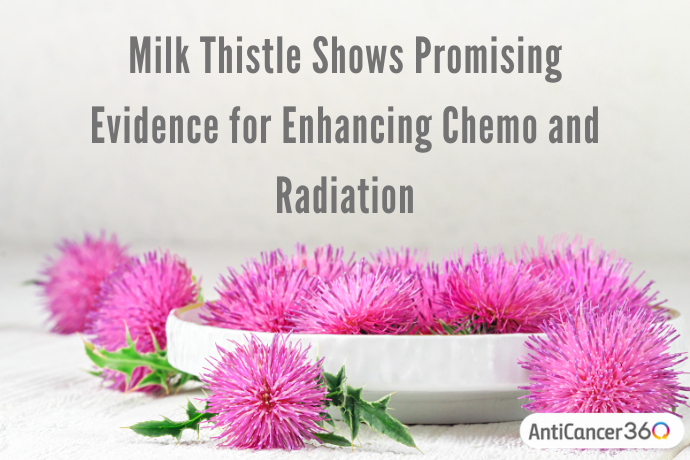
In another lab study of human prostate cancer cells, the addition of silybin to cisplatin increased cell death (apoptosis) from 8% to 15%. In the same study, the addition of silybin to carboplatin doubled the apoptosis rate from 20% to 40%. These exciting results demonstrate the potential ability of milk thistle to make cancer cells more vulnerable to chemotherapy drugs like cisplatin and carboplatin [12].
Ultimately, you can see that there can be many potential benefits to adding a natural dietary supplement like milk thistle to your overall anticancer program… so next, we’ll explain how to take it and what to expect.
How To Use Milk Thistle: Dosages, Side Effects, and Precautions
Dosage
The usual dosage of oral milk thistle supplements is 140 mg to 200 mg milk thistle extract one to three times daily [1].
Some researchers have studied higher doses of 700 mg silymarin three times a day for up to 24 weeks and found it was well-tolerated [8],[13].
Side Effects
Milk thistle is generally well-tolerated with very few side effects.
High doses may rarely cause stomach discomforts like nausea, diarrhea, heartburn, bloating, gas, or reduced appetite [1],[13].
Precautions
It’s possible to be allergic to milk thistle, especially in people who are allergic to ragweed, chrysanthemums, marigolds, daisies, and some other herbs. Signs of minor allergic reaction include itching and rash. More serious allergic reactions have occurred, including hives and anaphylaxis [1].
It’s also possible that silymarin can have some estrogen-like effects. Women with hormone sensitive cancers should weigh the benefits versus risks of milk thistle with their healthcare professional [1].
Interactions with Drugs and Supplements
Milk thistle has some known drug interactions. Many unknown potential interactions can happen with milk thistle, especially with chemotherapy and other supplements or medicines. This is not a comprehensive list of possible interactions.
- Herbs or Drugs with Blood Sugar Lowering Effects. Milk thistle extract compounds can support lower blood sugar levels. People taking diabetes medicines (e.g. metformin) or herbs that can also lower blood sugar (e.g. berberine) should cautiously use milk thistle products. Monitor your blood sugar levels closely. Dose adjustments may be necessary [1].
- Herbs or Drugs Metabolized by Certain Liver and Kidney Enzymes. Milk thistle extract might slow down the activity of specific enzymes that are responsible for metabolizing some medicines and herbs. These enzyme interactions can lead to increased side effects of certain medications. Your doctor may need to adjust your dose of products that could interact.
Before starting milk thistle, or any medication, including prescription drugs or over-the-counter products, you must consult with your healthcare provider.
Will Milk Thistle Strengthen Your Personal Battle with Cancer?
Overall, there can be many potential benefits to adding a natural dietary supplement like milk thistle to your anticancer program.
When using the “Aggressive Integrative Approach” to cancer, the goal is to fight cancer from every possible angle. This approach includes integrating natural supplements to fight cancer based on available evidence, despite limited human studies, and to do it in a safe way that won’t interfere with your oncology treatments.
Our Aggressive Integrative Approach advises taking advantage of the time in between your cycles of the oncologist’s treatments. Time is the #1 most precious resource when you are fighting advanced cancer. Also, some natural supplements may help reduce side effects and improve the success of oncology treatments. We can guide you on the appropriate use of natural substances with potential anticancer benefits to support your body from every angle.
So now we’d love to hear from you. How are you approaching your treatments? Are you taking any supplements? Have you tried milk thistle, and what has your experience been like so far? Let us know in the comments below!
If you’re interested in using an Aggressive Integrative Approach for your case… you can learn more about our program by watching one of our free online webinars.
Please discuss the risk-versus-benefit potential with your healthcare professional before starting any natural supplement, including milk thistle.
Are You A Candidate For Our Program?
If you’d like to learn more about the AntiCancer360 approach and see if we can help you… please watch our free online webinar to learn more about our approach. Then at the end, you’ll be able to schedule a free call with someone from our team so that we can discuss your case in more detail.
Citations
Dr. Patricia Weiser is one of AntiCancer360’s consultant pharmacists, science advisors, and medical writers. Her expertise helps us create safe herbal and supplement combinations and avoid potential drug interactions.
Patricia is a graduate of the University of Pittsburgh and a licensed pharmacist. She has clinical experience in both community and hospital pharmacy. She is passionate about integrative and preventative care and strives to empower her patients to take an active role in their health.

